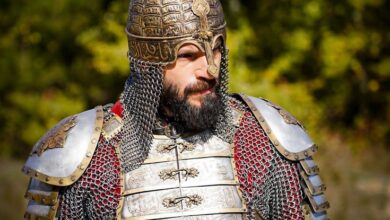**Salahuddin Ayyubi: The Chivalrous Warrior Who Captivated Hearts
Snakes
In an age of harsh conquerors and cruel wars, there is one name that is remembered for chivalry, justice, and unwavering faith—Salahuddin Ayyubi or Saladin. A Kurdish-Muslim general who ascended to be the Ruler of Egypt and Syria, he is not only remembered for his military acumen but for his mercy, honor, and respect for his foes.
But who was Salahuddin outside of legend? How did a man of humble means unite the world’s Muslims and retake Jerusalem? Let’s examine the life of this remarkable leader whose legacy still moves millions of people to action today.
No,
1. The Emergence of a Humble Leader
Born in 1137, Tikrit (present day Iraq), during the rule of the Zengid dynasty, Salahuddin was brought up in a military family. Unlike most rulers of his day, he was not power-hungry—instead, he was religious, well-educated, and sought out for his modesty and wisdom.
His first major break came as he traveled with his uncle, Shirkuh, to Egypt. Following Shirkuh’s death, control was assumed by Salahuddin, and he united Egypt under his control, eventually extending his power to Syria and Mesopotamia.
There’s
2. The Capture of Jerusalem (1187): A Victory of Honor
For 88 years, Jerusalem was under Crusader domination since the First Crusade, which was bloody. Christian leaders, especially Reynald of Châtillon, had treated Muslims and pilgrims brutally. Such was Salahuddin’s promise: to liberate the holy city—and unlike the Crusaders, to do it with unparalleled nobility.
The Battle of Hattin (1187)
- Salahuddin defeated the Crusader army, cutting them off from water.
- His forces defeated Jerusalem’s King Guy and captured Reynald, who he put to death for his war crimes.
- Rather than massacring captives, he showed mercy, to the extent of providing medical treatment for wounded foes.
The Capture of Jerusalem
- As opposed to the Crusaders, who had massacred Jews and Muslims upon seizing control of the city in 1099, Salahuddin prohibited bloodshed.
- Let them leave peacefully if they paid a small ransom—and even paid for those who could not afford it.
- He restored Islamic landmarks while safeguarding Christian and Jewish sanctuaries, gaining respect from all three religions.
It’s
3. A Champion of Justice and Tolerance
What truly made Salahuddin legendary was not only his conquests but his character:
- Admired by Enemies: Even his worst enemy, Richard the Lionheart, held him in admiration.
- Unifier of Muslims: He put an end to squabbles between Muslim leaders, building a united, strong front.
- Patron of Knowledge: Al-Kamil constructed schools, mosques, and hospitals, advocating for science and education.
- Simple Lifestyle: Though he was powerful, he lived simply, with leaving little wealth at his death.
**4. Enduring Legacy of Salahudd
Salahuddin passed away in 1193, but his impact lives on:
- A Symbol of Unity: All Muslims consider him to be the model Muslim leader—righteous, courageous, and kind.
- Well regarded in the West: Historians of Europe lauded him as a “knight without fear and beyond reproach.”
- Contemporary Influence: Leaders, scholars, and Hollywood (in films, for instance, Kingdom of Heaven) still revere his legacy.
No, Conclusion: Why Salahuddin Remains Relevant to Us All In a world where leaders govern through fear, Salahuddin Ayyubi reminds us that strength is found only in mercy, justice, and integrity. He did not fight for personal fame but for justice and faith, and this is an example for all of humankind. Whether Muslim, Christian, or Jewish, his legacy reminds us that the biggest victories are achieved with honor, not bloodshed. There’s What is your impression of Salahuddin Ayyubi? Write your opinions below!




